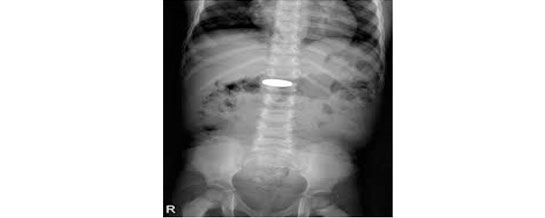How to Care for Your Child with a Foreign Body Ingestion
This leaflet will provide you with information about ingestion of foreign body symptoms, diagnosis, treatment and home care advice.

What is a foreign body ingestion?
A foreign body ingestion is when a child accidentally ingests or swallows an object that is not supposed to be in the digestive system. The digestive system consists of the parts of the body that work together to turn food and liquids into energy. For example, the esophagus, stomach and colon are parts of the digestive system.
Most swallowed objects pass through the digestive system without any problems once they have reached the stomach.
What are the types of foreign bodies that can be swallowed by a child?
Small metal coins are the most common type of ingestions and are often harmless when swallowed by children.
Harmful objects that have the potential to cause serious complications
include:
- Large metal coins
- Batteries; especially button or disc batteries
- Sharp or pointed objects, especially if
- long (more than 5cm long)
- Wide (more than 2 cm in width in infants)
- Wide (more than 3 cm in children)
- High-powered magnets for example, fake tongue piercings / neodymium magnets
- Items containing lead
- Superabsorbent polymers: these are a type of material that can expand on contact with saliva. They have the ability to absorb up to 300 times their weight. They are found in products which are designed to contain fluids such as baby diapers/nappies, incontinence products, and feminine hygiene pads and liners.
What are the symptoms of a foreign body ingestion?
Children that swallow a foreign body may show the following symptoms:
- Drooling
- Difficulty in swallowing
- Gagging
- Vomiting
- Pain in the neck or chest
- Refusing to feed
- Coughing and choking
- Blood in vomit
- Abdominal (tummy) pain
A foreign body that has been in the stomach or intestines for a while may cause abdominal pain, vomiting, or blood in stool (poo). If it is still inside the body for a longer time, the child can show signs of fever or weight loss.
How is a foreign body ingestion diagnosed?
Most swallowed foreign bodies are harmless and pass through the digestive system normally.
The doctor will ask a few questions about your child’s health and examine your child. Your doctor will decide if further testing is required. for example:
- Metals, such as coins, magnets, glass, and bones can be seen on an X-ray.
- Paper, wood or plastic objects may not be seen on an X-Ray and would require different kind of procedure.
How is a foreign body ingestion treated?
For a harmless foreign body, if the:
- Foreign body is in the stomach,
- Child tolerates food intake
- Child has no symptoms of and no difficulty breathing
Then the child can safely go home as it is likely to be passed through their digestive system.
For a harmful foreign body: the treatment will depend on where the object is. The doctor will see where it is from the x-ray. Then the doctor may decide:
- To keep the child in the hospital under observation and allow your child to eat and drink. Then the doctor
- may repeat the X-Rays within 3-7 days
or - Remove the foreign body immediately, this normally needs surgery or by using a tube connected to camera to remove the foreign body from the esophagus
- may repeat the X-Rays within 3-7 days
How can I care for my child at home?
- Keep all small, and harmful objects out of the reach of children
- We do not advise that you examine your child’s stool(poo) to find the swallowed object
- Allow your child to eat and drink and do things normally
When should I Go to the Emergency Department?
Bring your child to the Children’s Emergency Department immediately if they have:
- Swallowed a coin, battery, metal, or magnet
- Ongoing vomiting
- Abdominal (tummy) pain
- Blood in their vomit or poo
- Fever
- a change in their eating patterns for example refusing food or drink

